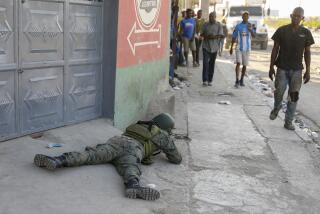U.S. Has Authority to Launch Haiti Invasion, Panetta Says : Caribbean: Incoming chief of staff insists President has made no decision. Sen. Dole questions need for action.
- Share via
WASHINGTON — The U.S. government has ample authority under U.S. and international law to invade Haiti if President Clinton chooses to take that step, incoming White House Chief of Staff Leon E. Panetta said Sunday.
Although Panetta said the Administration would consult closely with Congress before ordering U.S. troops into action, he said the President does not have to seek advance authorization from Capitol Hill. And he said additional action by the U.N. Security Council probably is not necessary either.
“If we have to exercise the military option, the authority is there,” he said on the NBC-TV program “Meet the Press.”
Panetta insisted, as have other Administration officials in recent days, that the President has not decided if he will authorize military action. But he said the Administration is determined to restore democracy to Haiti by whatever means necessary.
The bleak conditions in the impoverished island nation, which have prompted thousands of refugees to flee in recent weeks, cannot be allowed to continue, Panetta said.
“I don’t think we can sit back and allow that kind of turmoil to continue,” he said. “We’ve got to act. We cannot sit back and allow the status quo to eat us alive.”
While Panetta, who takes over as chief of staff today, and other Administration officials continue to maintain that Washington hopes economic and political pressure will be enough to cause the military government of Lt. Gen. Raoul Cedras to step aside and allow exiled President Jean-Bertrand Aristide to return, congressional critics of the Administration policy say that the likelihood of an invasion is growing by the day.
Senate Republican leader Bob Dole of Kansas said it would be a mistake to risk U.S. lives in Haiti, “but I think they are right on the edge” of sending in troops.
Dole made it clear he is unconvinced by the President’s rationale for his Haiti policy. He rejected the Administration’s assertion that the brutal Cedras dictatorship is responsible for the large number of refugees, arguing instead that U.S.-backed economic sanctions are causing the hardships forcing Haitians to flee. And he said the United States should not use military force only to restore democracy.
Interviewed on the CBS-TV program “Face the Nation,” Dole said it would be a mistake for the U.S. government to “run around invading countries because of democratic principles. If there (are) American interests threatened or American lives threatened, that’s another thing. But that hasn’t happened.”
Approaching the issue from the opposite end of the political spectrum, Rep. Kweisi Mfume (D-Md.), chairman of the Congressional Black Caucus, also said the Administration is moving steadily toward an invasion.
“The options are quickly running out,” Mfume said. “And, unfortunately, we’re getting closer and closer to military action.”
Mfume shares the Administration’s stated objective of restoring Aristide, Haiti’s only freely elected president, to the office he lost in a September, 1991, coup. But the lawmaker complained that the Administration’s inconsistency on tactics has undercut its policy.
Mfume urged the Administration to increase the pressure on Cedras and his associates by tightening the embargo and possibly using air power instead of invading.
The use of force to topple the regime has been conditionally endorsed by the general secretary of the National Council of Churches and the presiding bishop of the Episcopal Church.
In separate statements issued in New York on Friday, the Rev. Joan B. Campbell of the National Council of Churches and the Most Rev. Edmond L. Browning of the Episcopal Church said bloodshed and suffering on the island must end quickly.
While both church leaders said they had hoped military intervention would not be necessary, they said it may be the only course left in view of what Browning called the continuing specter of terror against the Haitian people and the refusal of the Haitian military leaders to step down.
Times religion writer Larry B. Stammer contributed to this report.
More to Read
Sign up for Essential California
The most important California stories and recommendations in your inbox every morning.
You may occasionally receive promotional content from the Los Angeles Times.













